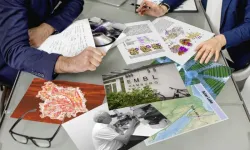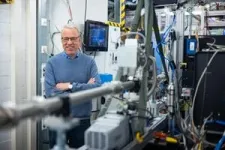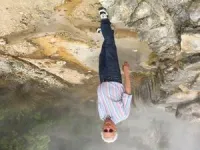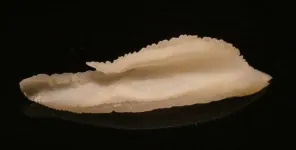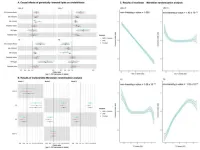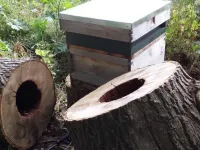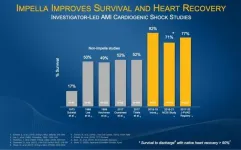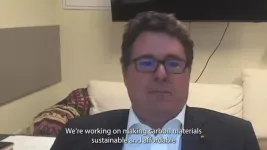(Press-News.org) During the nearly five decades of its operation, the European Molecular Biology Laboratory (EMBL) in Hamburg has developed many fruitful collaborations with other scientific institutions located in the Hamburg metropolitan area. One example is the long-lasting collaboration between researchers at EMBL Hamburg and the Center for Biobased Solutions (CBBS) at the Hamburg University of Technology (TUHH), which has recently yielded new insights into the structure and function of a lipid-degrading enzyme found in a microbe adapted to living in extreme conditions. The findings could help improve chemical processes in various branches of industry.
In this interview, Matthias Wilmanns and Garo Antranikian, who lead respective research groups at EMBL Hamburg and TUHH, discuss how their collaboration developed over almost two decades.
What motivated you to study enzymes from organisms living in extreme conditions?
Garo Antranikian: Throughout my career, I was consistently motivated by the wonders of nature, which never failed to inspire my research work. Collaboration with industry further amplified this creative energy leading to the realisation of innovative technologies. We are experiencing a sort of a revolution nowadays – a transition to a circular economy and sustainable technologies that rely on biomass like starch, fats, and cellulose. Biology will play a dramatic role in it by enabling ways to use these resources more efficiently.
Biomass can be degraded to compounds useful for various industries, such as the food and the pharmaceutical industries. It’s possible to do this via chemical reactions, but they are not very exact and you get side reactions and contamination. However, in nature, enzymes can carry out reactions very precisely and without producing compounds that are harmful for our environment.
In many cases, enzymes are very specific but complex, so we need to study and understand them in more detail to develop efficient and environmentally friendly enzymatic processes useful for the industry.
For scientists like Matthias and I, it’s extremely interesting to learn from nature. With this knowledge and with artificial intelligence, I think it will be possible to develop completely new nature-inspired enzymes in the future, and make totally new products, such as new bioplastics.
That’s why we started working together, and we focused in particular on a lipid-degrading enzyme found in extremophiles – microbes adapted to extreme conditions. Enzymes from extremophiles exhibit remarkable resilience in extreme conditions. Particularly, at elevated temperatures, reactions become both faster and more efficient. This characteristic also allows the development of more sustainable and effective industrial processes.
Matthias Wilmanns: This was actually one of the reasons why I found this project motivating. The structures of enzymes from organisms living in extremely high temperatures are more stable and thus more likely to be solved using structural biology methods.
I had also other reasons, of a more private nature. The organisms adapted to extreme environments come from the most exotic places in the world, and I find it fascinating. For example, the enzyme that we worked on with Garo comes from a microbe isolated from the Solar Lake in the Middle East.
Finally, I have very much enjoyed working with Garo over extended periods of time, especially in recognition of the fact that he has pioneered the field of research with extremophilic organisms.
How did you start working together?
Matthias Wilmanns: We first met 23 years ago – in 2000. At that time, I was particularly interested in enzymes from extremophilic conditions and wanted to explore their properties at the molecular level that let them adapt to those conditions.
Garo Antranikian: I'm a microbiologist, so I was interested in microbial physiology – how microbes live, how they make products, how they degrade complex chemical compounds etc. And Matthias knows the technology to analyse enzyme structure, the interaction of these enzymes with other molecules, and so on.
With interdisciplinary research, you can get much better results, so, we need to work together. And especially in Hamburg, where we’re lucky to have so many tools and infrastructures available, Matthias and I had good opportunities to do that.
Matthias Wilmanns: That’s why I’m very positive about the Science City Hamburg Bahrenfeld, and its potential to stimulate scientific exchange in the metropolitan area of Hamburg. The TUHH in Hamburg- Harburg is another leading hub. This concept has the potential to evolve the city even more as a leading hub for research worldwide.
The research that Garo and I have been pursuing for the last two decades is now also highly relevant for the current EMBL programme ‘Molecules to Ecosystems’.
What challenges did you overcome to complete this work?
Matthias Wilmanns: Our ambition was not just to solve the structure of the enzyme, but to make it useful in terms of possible applications and learn about its mechanisms of function. That’s why we aimed to not only solve the structure, but also see how it interacts with lipid molecules as it degrades them.
The ability of lipids to dissolve in water is close to zero, while the enzyme is water soluble. So, there's absolutely no way to get both into a crystal (needed for X-ray crystallography experiments) using conventional methods. We had to find a way around it. It was a lucky break that the enzyme is heat-resistant, because at high temperatures, the lipids mix with the water and the enzyme a little bit – just enough for us to capture them together in an experiment.
What did you learn from this collaboration?
Garo Antranikian: Of course, scientifically, we’ve learned a lot from each other. But I’ve also learned to be patient and not to lose hope. And I’ve learned that from Matthias, because he’s more patient than I am [laughs].
Matthias Wilmanns: For me, Garo opened my mind to research areas I wasn’t familiar with before. The collaboration enabled me to learn about the unique research profile of the TUHH and different ways of approaching research, with potential applications very much in the mindset. Through the collaboration, I got to know many researchers with whom I later collaborated.
What advice would you give to other scientists who want to start interdisciplinary projects?
Garo Antranikian: From my experience, I got my best papers when the projects were not well planned [laughs]. This is because when you plan everything and you expect certain results, the level of innovation is very low. You should be very enthusiastic, motivated, and then try to take risks.
Also, you have to try to collaborate with people that you don't naturally expect to collaborate with, who are outside your discipline, and then try to create new ideas. Communication is extremely important, such as interaction with other researchers, institutions, industry etc. Without it, you can’t really get innovation.
END
Hamburg collaboration paves the way to cleaner technologies for industry
Interdisciplinary collaboration combining structural biology and microbiology provides insights on a heat-resistant enzyme from an exotic microbe, which might contribute to transition to more sustainable industrial processes
2023-11-27
ELSE PRESS RELEASES FROM THIS DATE:
Pioneering research method reveals bluefin tuna’s fate
2023-11-27
The return of bluefin tuna to Northern European waters is a conservation success story, but rising sea temperatures in their Mediterranean nursery grounds mean this recovery may be short-lived, according to new research led by the University of Southampton.
Temperatures expected in the Mediterranean within the next 50 years are expected to drive juvenile tuna out of the Mediterranean, where they may be accidentally caught in existing sardine and anchovy fisheries – requiring fishery managers to adapt their methods to allow tuna nurseries to establish.
Outlining the research, published in Nature, lead author Clive Trueman, Professor of Geochemical Ecology ...
New study sheds light on the link between lipids and cholelithiasis
2023-11-27
A new study published in the journal Gut has shed light on the complex relationship between serum lipids, lipid-modifying targets, and cholelithiasis, a common condition characterized by the formation of gallstones. The study, led by researchers at the First Hospital of Jilin University, employed a combination of observational and Mendelian randomization (MR) approaches to comprehensively assess these associations.
Cholelithiasis is a prevalent hepatobiliary disorder that primarily affects Western populations. It is a significant risk factor for cholangiocarcinoma, ...
Honeybee cluster—not insulation but stressful heat sink
2023-11-27
With images - the visual assets can be downloaded by clicking on this WeTransfer link:https://we.tl/t-mbRtSW5BzO
*See further information at end of release for captions and required pic credits
A Leeds researcher is keen to help beekeepers shape their practices following his study which appears to disprove the widespread belief that honeybees naturally insulate their colonies against the cold. His findings suggest that the creatures are potentially being subjected to thermally-induced ...
Smog from Copenhagen’s Bispeengbuen heads straight into living rooms
2023-11-27
A large amount of the heavy automobile pollution from Copenhagen’s Bispeengbuen thoroughfare goes straight into people's homes. This, according to a study by researchers at the University of Copenhagen. A sensor developed by one of the researchers can help fill in the blanks of our understanding about local air pollution.
Air pollution cuts the lives of more than four thousand Danes short every year. Locally, we have a very limited understanding how many harmful substances waft in the air we breath. Indeed, air pollution is only monitored at fourteen locations across Denmark.
This ...
Most unmarried, low-income couples show positive co-parenting
2023-11-27
COLUMBUS, Ohio – Despite the many challenges they face, slightly more than half of unmarried low-income couples with children have positive co-parenting relationships, a new study found.
And those supportive relationships were linked to their children showing more empathy, less emotional insecurity and fewer behavior problems.
Parents who are good co-parents work together as a team, provide support to each other and back up each other’s parenting decisions, said Susan Yoon, lead author of the study and associate professor of social work at The Ohio State University.
Those types of relationships may be particularly hard for the parents in this study, ...
Mount Sinai researchers find testosterone hormone therapy for transmasculine individuals is safer than previously thought
2023-11-27
A common concern about gender-affirming hormone therapy for transmasculine people is the risk of red blood cell volume changes and erythrocytosis, a high concentration of red blood cells, with the use of prescribed testosterone. However, Mount Sinai researchers have found that testosterone treatment may be safer than previously reported, with results published today in The Journal of Clinical Endocrinology and Metabolism.
Mount Sinai researchers from the Division of Endocrinology and Center for Transgender Medicine and Surgery examined the relationship between the use of testosterone as part ...
Making a difference, belonging drives rural festival volunteers and bolsters community development
2023-11-27
AMES, Iowa — During Orange City’s three-day tulip festival each May, the northwest Iowa town attracts roughly 40,000 visitors, more than six times its population. People come for the blooms and parades, traditional Dutch food and musical theater. For the community, it’s an opportunity to celebrate its cultural heritage and give a boost to local businesses.
Volunteers are essential to the festival’s success, as they are for many rural celebrations across the Midwest. But not a lot of research has examined their motivations. To help fill this gap, researchers surveyed hundreds of volunteers from 12 festivals — including ...
First patient enrolled in Abiomed’s RECOVER IV randomized controlled trial of Impella as a therapy for AMI cardiogenic shock
2023-11-27
DANVERS, Mass. – Nov. 27, 2023 – Abiomed, part of Johnson & Johnson MedTech[1], announces the first patient in the world has been enrolled in the landmark RECOVER IV randomized controlled trial (RCT). The on-label, two-arm trial will randomize 548 patients to assess whether Impella support prior to percutaneous coronary intervention (PCI) is superior to PCI without Impella in patients with acute myocardial infarction (AMI) cardiogenic shock.
Impella is the only mechanical circulatory support device for the treatment of AMI cardiogenic ...
Kavli Exploration Award backs Rice-led sustainable carbon materials research
2023-11-27
HOUSTON – (Nov. 27, 2023) – An international team of scientists led by Rice University’s Matteo Pasquali has won a $4.1 million grant to optimize carbon nanotube synthesis, a process that could help drive the green energy transition by providing more sustainable alternatives to materials dependent on heavy industry. The award is a joint effort by The Kavli Foundation, with a $1.9 million Kavli Exploration Award in Nanoscience for Sustainability, and Rice’s Carbon Hub, which contributed an additional $2.2 million.
“The energy transition is primarily a material transition,” Pasquali said. “Renewable energy ...
Mixing heat with hair styling products may be bad for your health
2023-11-27
Hair products often contain ingredients that easily evaporate, so users may inhale some of these chemicals, potentially posing health repercussions. Now, researchers have studied emissions of these volatile organic compounds (VOCs), including siloxanes, which shine and smooth hair. The scientists report in ACS’ Environmental Science & Technology that using these hair care products can change indoor air composition quickly, and common heat styling techniques — straightening and curling — increase VOC levels even more.
Some ...
LAST 30 PRESS RELEASES:
Study: Reported crop yield gains from breeding may be overstated
Stem cells from human baby teeth show promise for treating cerebral palsy
Chimps’ love for crystals could help us understand our own ancestors’ fascination with these stones
Vaginal estrogen therapy not linked to cancer recurrence in survivors of endometrial cancer
How estrogen helps protect women from high blood pressure
Breaking the efficiency barrier: Researchers propose multi-stage solar system to harness the full spectrum
A new name, a new beginning: Building a green energy future together
From algorithms to atoms: How artificial intelligence is accelerating the discovery of next-generation energy materials
Loneliness linked to fear of embarrassment: teen research
New MOH–NUS Fellowship launched to strengthen everyday ethics in Singapore’s healthcare sector
Sungkyunkwan University researchers develop next-generation transparent electrode without rare metal indium
What's going on inside quantum computers?: New method simplifies process tomography
This ancient plant-eater had a twisted jaw and sideways-facing teeth
Jackdaw chicks listen to adults to learn about predators
Toxic algal bloom has taken a heavy toll on mental health
Beyond silicon: SKKU team presents Indium Selenide roadmap for ultra-low-power AI and quantum computing
Sugar comforts newborn babies during painful procedures
Pollen exposure linked to poorer exam results taken at the end of secondary school
7 hours 18 mins may be optimal sleep length for avoiding type 2 diabetes precursor
Around 6 deaths a year linked to clubbing in the UK
Children’s development set back years by Covid lockdowns, study reveals
Four decades of data give unique insight into the Sun’s inner life
Urban trees can absorb more CO₂ than cars emit during summer
Fund for Science and Technology awards $15 million to Scripps Oceanography
New NIH grant advances Lupus protein research
New farm-scale biochar system could cut agricultural emissions by 75 percent while removing carbon from the atmosphere
From herbal waste to high performance clean water material: Turning traditional medicine residues into powerful biochar
New sulfur-iron biochar shows powerful ability to lock up arsenic and cadmium in contaminated soils
AI-driven chart review accurately identifies potential rare disease trial participants in new study
Paleontologist Stephen Chester and colleagues reveal new clues about early primate evolution
[Press-News.org] Hamburg collaboration paves the way to cleaner technologies for industryInterdisciplinary collaboration combining structural biology and microbiology provides insights on a heat-resistant enzyme from an exotic microbe, which might contribute to transition to more sustainable industrial processes
